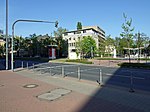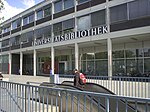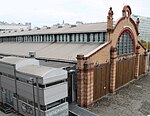University of Frankfurt Institute for Social Research
Columbia UniversityEducation in FrankfurtFrankfurt SchoolGoethe University FrankfurtMarxist theory ... and 5 more
Social philosophySocial researchSociological organizationsSociological theoriesWeimar culture

The Institute for Social Research (German: Institut für Sozialforschung, IfS) is a research organization for sociology and continental philosophy, best known as the institutional home of the Frankfurt School and critical theory. Currently a part of Goethe University Frankfurt, it has historically also been affiliated with Columbia University in New York City.
Excerpt from the Wikipedia article University of Frankfurt Institute for Social Research (License: CC BY-SA 3.0, Authors, Images).University of Frankfurt Institute for Social Research
Senckenberganlage, Frankfurt Westend Süd (Innenstadt 2)
Geographical coordinates (GPS) Address External links Nearby Places Show on map
Geographical coordinates (GPS)
| Latitude | Longitude |
|---|---|
| N 50.118414 ° | E 8.65385 ° |
Address
Institut für Sozialforschung (IfS)
Senckenberganlage 26
60325 Frankfurt, Westend Süd (Innenstadt 2)
Hesse, Germany
Open on Google Maps











